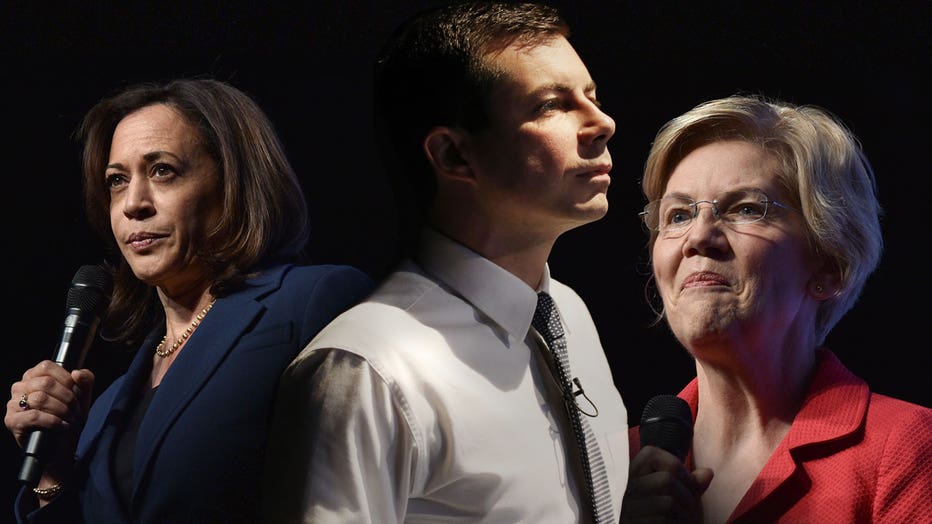Democratic debate: Pete Buttigieg, who is rising in the polls, could face attacks
ATLANTA - Pete Buttigieg’s dramatic rise from little-known Indiana mayor to a leading Democratic presidential candidate faces its toughest test on Wednesday, with rivals poised to lob debate-stage attacks in an effort to stall his momentum.
The debate in Atlanta marks the first time Buttigieg will face other White House hopefuls as an undisputed member of the top tier.
The 37-year old mayor of South Bend, Indiana, gained significant ground in recent months in Iowa, which holds the nation’s first caucuses in February. He is bunched at the top of most polls in Iowa with candidates who have much longer political resumes: former Vice President Joe Biden and Sens. Elizabeth Warren of Massachusetts and Bernie Sanders of Vermont.
Some surveys are beginning to show him taking a more convincing lead in the race.
Buttigieg still faces plenty of hurdles to clinching the Democratic nomination, particularly winning over black and other minority voters. But his Iowa rise means he could come under fire from his rivals like never before.
“Anytime a candidate pops up above the pack, there’s a vigorous effort to vet them,” said Democratic strategist Zac Petkanas. “Buttigieg is going to have to prove that his recent rise is not just a flash in the pan.”
Biden, Warren and Sanders have all faced similar scrutiny in previous debates, and those attacks did little to change the trajectory of the race.

Democratic candidates Sen. Kamala Harris, Mayor Pete Buttigieg and Sen. Elizabeth Warren are shown in a file photo. (Photo credit: Getty images)
The debate will unfold at a moment of uncertainty about the Democratic field, with some in the party, particularly donors, worried there’s no one positioned to defeat President Donald Trump. Former President Barack Obama took the unusual step last week of warning the party against moving too far to the left.
Speaking to that anxiety, former Massachusetts Gov. Deval Patrick entered the Democratic race last week. Billionaire Michael Bloomberg, the former New York City mayor, is openly flirting with a bid.
Neither Patrick nor Bloomberg will be onstage Wednesday.
With less than three months before voting, much of the nation’s political attention would typically be focused on the primary. Instead, the focus is on the impeachment inquiry against Trump.
Hours before the debate, Gordon Sondland, the U.S. ambassador to the European Union, will testify before Congress in an appearance that will be closely watched for new evidence that Trump pressured leaders in Ukraine to find damaging information about Biden.
Some campaigns have privately questioned whether a debate against the backdrop of impeachment would have much impact. Still, for the candidates at the bottom of the polls who face increasingly dire prospects, nothing provides the opportunity for a breakout moment like two hours of exposure on national television.
“We’re at the phase in the campaign where voters are beginning to make decisions, and they’re beginning to see which of these candidates can go up against Trump and which can serve as president,” said Jesse Ferguson, who worked for Hillary Clinton’s campaign in 2016. “This is the time period where people start making decisions and locking in, regardless of what’s going on in Washington.”
New Jersey Sen. Cory Booker faces especially intense pressure. He’s yet to meet the Democratic National Committee’s polling requirements for the December debate, and his campaign acknowledges that he needs to capitalize on the national spotlight.
Minnesota Sen. Amy Klobuchar offered the model last month by repeatedly calling for a “reality check” on Warren and her sweeping progressive agenda. Klobuchar’s campaign said the subsequent few days were her best fundraising period yet. But it still hasn’t shown up in national or most early state polls.
For California Sen. Kamala Harris, it’s the first debate since cutting her operation in New Hampshire, the first primary state, and concentrating on Iowa. Like Klobuchar, Harris has qualified for the December stage but needs more than the minimum polling performance to make any serious play for the nomination.
That trio of senators could see Buttigieg’s resume as a prime target, with his political experience limited to running a city of about 100,000 residents.
The Buttigieg campaign expects the scrutiny and has taken an increasingly tough posture. The mayor was noticeably more aggressive during the October debate, joining Klobuchar with a more moderate argument against Warren’s and Sanders’ policy pitches for single-payer government health insurance, among other ideas.
This is the first debate since Warren said she would gradually guide the country to a “Medicare for All” system if elected president. The move prompted criticism from Sanders, who is arguing for a more immediate shift to a single-payer system, and has left her open to skepticism from moderates who say her plan is unworkable and could feed into Trump’s criticism of Democrats as socialists.
Warren and Biden, meanwhile, have been viewed as national front-runners in recent months but have yet to take each other on directly enough to define previous debates. They have, however, ratcheted up their rhetoric toward each other in recent weeks — often without naming the other.
At a major Democratic gathering in Iowa this month, Warren suggested that rivals who disagreed with her call for “big structural change” might be running in the “wrong” party’s primary. Biden took umbrage, defending his proposals as “bold” and “ambitious,” while accusing Warren of being dishonest about the cost of her agenda and the likelihood she could get it through a divided Congress.
Ferguson, the Democratic strategist, downplayed the idea that the details of Warren’s or anyone else’s health care plan will determine the primary outcome.
“Democrats are arguing over Coke vs. Pepsi, while Donald Trump is selling arsenic,” he said, referring to GOP efforts to roll back the 2010 Affordable Care Act.
The debate airs on MSNBC from 9 p.m. to 11 p.m. EST.

